Spring has sprung down-under with a wonderful – and much appreciated display of wildflowers and colourful crops (not to mention some colourful weeds too!) We have continued reading, though perhaps not quite as much as we did over winter.
As always, please check the end of this round-up for the latest awards news.
Sunny September
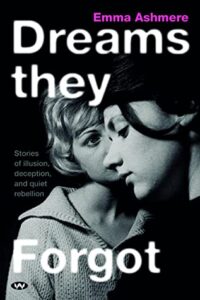 Our September count of 42 reviews is ten less than last month, but the same as last September. Here are the highlights:
Our September count of 42 reviews is ten less than last month, but the same as last September. Here are the highlights:
- Our most reviewed authors this month were Emma Ashmere with her new short story collection Dreams they forgot, and Kate Mildenhall with The mother fault.
- Our most reviewed books were those by our most reviewed authors!
- Our top reviewers were Jennifer Cameron-Smith (GoodReads), with 5 reviews, and Kim Forrester (Reading Matters) and Theresa Smith (Theresa Smith Writes) with 4 posts each.
The Classics
No classics were reviewed in September, which is a shame, but, c’est la vie! Worse things are happening, eh?
Historical fiction
I haven’t featured historical fiction since July 2019, so, with the announcement of the longlist for the new ARA Historical Novel Prize, I figured it was time to focus on this genre again. Fifteen historical novels were tagged as literary in September. That’s 35% of this month’s reviews, making it clearly popular with our contributors. All but one were published between 2018 and 2020.
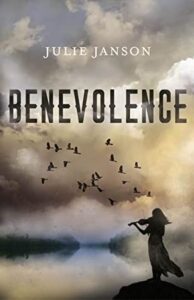 Seven, or, nearly half of the reviews, were tagged “indigenous issues” and/or “indigenous authors”. Those by Indigenous authors are Julia Janson’s Benevolence, Nardi Simpson’s Song of the crocodile and Tara June Winch’s Miles Franklin awardwinning The yield. Denise Newton reviewed Janson’s Benevolence. It’s told from the perspective of a young woman from the Darug Nation, beginning in 1816. Muraging’s father takes her to live at the Governor Macquarie-established Parramatta Native Institution, whose aim was, as Denise writes,
Seven, or, nearly half of the reviews, were tagged “indigenous issues” and/or “indigenous authors”. Those by Indigenous authors are Julia Janson’s Benevolence, Nardi Simpson’s Song of the crocodile and Tara June Winch’s Miles Franklin awardwinning The yield. Denise Newton reviewed Janson’s Benevolence. It’s told from the perspective of a young woman from the Darug Nation, beginning in 1816. Muraging’s father takes her to live at the Governor Macquarie-established Parramatta Native Institution, whose aim was, as Denise writes,
to educate Aboriginal children in the language and ways of the English. Muraging’s father takes her there in the hope that if his daughter can learn to understand the settlers’ ways, she may be able to help her people. He promises to return for her.
Denise thought it a little disjointed, but perhaps she said this reflects Muraging’s life. She found the book “especially engrossing to read about the Darug experience in the region where I grew up and was educated, because I’d learnt nothing back then about the area’s first inhabitants”.
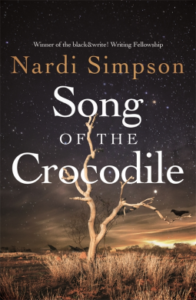 The other two books by Indigenous authors straddle the historical-contemporary divide. Simpson’s Song of the crocodile tells the story of a family across three generations, while Winch’s The yield is told in three voices ranging from the nineteenth century to contemporary times. Calzean introduces the Song of the crocodile as follows:
The other two books by Indigenous authors straddle the historical-contemporary divide. Simpson’s Song of the crocodile tells the story of a family across three generations, while Winch’s The yield is told in three voices ranging from the nineteenth century to contemporary times. Calzean introduces the Song of the crocodile as follows:
A racist, bigoted, sexist country town that pays homage to its original settlers while ignoring the original inhabitants who are shunted to live in a fringe community.
Jennifer approved this novel saying that
In this beautifully written story, with descriptions of land and the importance of connection, Ms Simpson explores what happens when connectedness is disrupted.
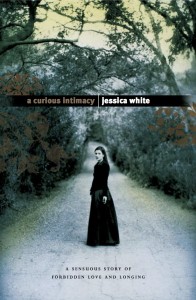 The oldest historical novel reviewed this month was Jessica White’s 2007 debut, A curious intimacy. Bill Holloway (The Australian Legend) reviewed it. Set in 1870s southwest Western Australia, it’s about a relationship that develops between two lonely women. Bill writes: “This is a contemplative, sometimes erotic novel and I greatly enjoyed it”. It includes excellent descriptions of the area’s botany, related to the fact that one of the women collects and illustrates flowers for a book her father is writing. It also reflects, Bill suggests, the research work White had presumably started for her book on botanist Georgiana Molloy.
The oldest historical novel reviewed this month was Jessica White’s 2007 debut, A curious intimacy. Bill Holloway (The Australian Legend) reviewed it. Set in 1870s southwest Western Australia, it’s about a relationship that develops between two lonely women. Bill writes: “This is a contemplative, sometimes erotic novel and I greatly enjoyed it”. It includes excellent descriptions of the area’s botany, related to the fact that one of the women collects and illustrates flowers for a book her father is writing. It also reflects, Bill suggests, the research work White had presumably started for her book on botanist Georgiana Molloy.
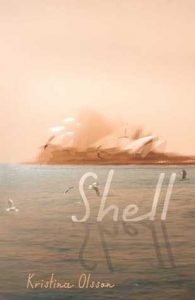 Other historical novels reviewed this month were Emma Ashmere’s short story collection, Dreams they forgot; Alison Booth’s The philosopher’s daughter; Anna Goldsworthy’s Melting moments; Kate Grenville’s A room made of leaves; Rosalie Ham’s Dressmaker’s secret; Kristina Olsson’s Shell; Holly Ringland’s The lost flowers of Alice Hart; and Mirandi Riwoe’s Stone sky, gold mountain. All are set in Australia, ranging from 19th century outback stories, through World War 2, to the building of the Sydney Harbour Bridge in the 1960s. To find reviews of these books, please use the Books Reviewed link at the top of the page.
Other historical novels reviewed this month were Emma Ashmere’s short story collection, Dreams they forgot; Alison Booth’s The philosopher’s daughter; Anna Goldsworthy’s Melting moments; Kate Grenville’s A room made of leaves; Rosalie Ham’s Dressmaker’s secret; Kristina Olsson’s Shell; Holly Ringland’s The lost flowers of Alice Hart; and Mirandi Riwoe’s Stone sky, gold mountain. All are set in Australia, ranging from 19th century outback stories, through World War 2, to the building of the Sydney Harbour Bridge in the 1960s. To find reviews of these books, please use the Books Reviewed link at the top of the page.
Awards News
Literary awards announcements continue with the following over the last month:
ARA Historical Novel Prize Shortlist
This new prize celebrating historical fiction will give the winner $50,000. Five of the 8-title shortlist are by women:
- Sienna Brown, Master of my fate
- Catherine Jinks, Shepherd
- Mirandi Riwoe, Stone Sky Gold Mountain
- Pip Williams, The dictionary of lost words
- Tara June Winch, The yield
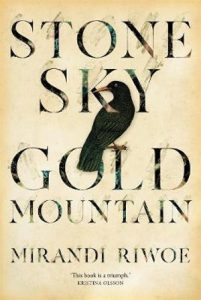 All but Brown’s book have been reviewed for the challenge, with three – Riwoe, Williams and Winch – reviewed this month. I’ll just share a quote from Calzean on Riwoe’s Stone sky gold mountain:
All but Brown’s book have been reviewed for the challenge, with three – Riwoe, Williams and Winch – reviewed this month. I’ll just share a quote from Calzean on Riwoe’s Stone sky gold mountain:
The author seems to have a thing about depicting minorities in a place that doesn’t want them. In her latest book, Riwoe gives us two Chinese siblings in a far north Queensland gold town sometime in the mid to late 1800s. Life is tough with white racism, Chinese gangs, slim pickings, lure of opium and gambling, heat, poor food and no friends.
Barbara Jefferis Award shortlist (4 of 5 by women)
This biennial award is for “the best novel written by an Australian author that depicts women and girls in a positive way or otherwise empowers the status of women and girls in society”. Four of the 5-tilte shortlist are by women:
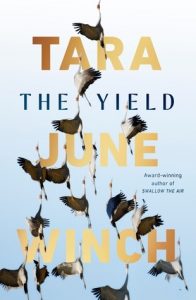 Melissa Lucashenko, Too much lip
Melissa Lucashenko, Too much lip- Favel Parrett, There was still love
- Lucy Treloar, Wolfe Island
- Tara June Winch, The yield
All have been reviewed for the challenge, but only Winch’s this month. Reviewer Kim (Reading Matters) loved it, saying that “reading this novel was a truly immersive experience in a way I have rarely known”.
Seizure Viva La Novella Prize
Created in 2012, this prize celebrates short novels. There were two winners this year, one being Lana Guineay’s Dark wave. It has not yet been reviewed for the challenge! You know what to do!
Voss Literary Prize Longlist
This prize for “the best novel from the previous year” is managed by the Australian University Heads of English. Five of this year’s 10-title longlist are by women:
- Meg Mundell, The trespassers
- Kate Richards, Fusion
- Carrie Tiffany, Exploded view
- Lucy Treloar, Wolfe Island
- Tara June Winch, The yield
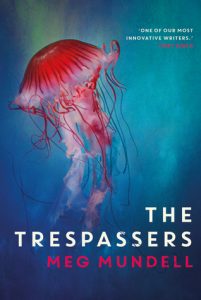 All have been reviewed for the challenge, with The trespassers and The yield reviewed in September. Jackie McMillan reviewed Mundell’s The trespassers which, being about the plague, made it unexpectedly apposite. Jackie writes:
All have been reviewed for the challenge, with The trespassers and The yield reviewed in September. Jackie McMillan reviewed Mundell’s The trespassers which, being about the plague, made it unexpectedly apposite. Jackie writes:
While the start of the novel is taut and compelling, it peters away at the rear, which in part is because the key characters are in indefinite offshore detention. It’s worth a look anyway, because the echos of COVID-19 are hard to ignore …
Keep well, keep safe, and keep reading!
———————
About Me
I am Whispering Gums and I read, review and blog about (mostly) literary fiction. It was reading Jane Austen when I was 14 years old that turned me on to reading literary fiction/classics, which is why I am here today doing this round-up! Little did Jane know what she started!
My love of Aussie literature started with Banjo Paterson’s ballads and Ethel Turner’s Seven Little Australians in my childhood. But, I didn’t really discover Australian women’s writing until the 1980s when I fell in love with Elizabeth Jolley, Thea Astley, Olga Masters, Helen Garner and Kate Grenville. Ever since then I have been included a good percentage of Australian (and other) women writers in my reading di





Lots happening on the prize front for Australian women. Terrific to see!
I’m very excited about the new historical fiction prize. I love following the Walter Scott Prize, so I’m thrilled to have an award that will feature Australian titles as well. Same for the Barbara Jefferis award. I love it’s stated aim.